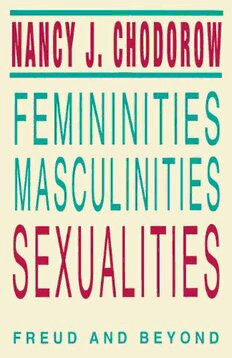
Femininities, Masculinities, Sexualities: Freud and Beyond PDF
Preview Femininities, Masculinities, Sexualities: Freud and Beyond
Femininities, Masculinities, Sexualities The Blazer Lectures for 1990 This page intentionally left blank FEMININITIES, MASCULINITIES, SEXUALITIES FREUD AND BEYOND Nancy J. Chodorow THE UNIVERSITY PRESS OF KENTUCKY Copyright © 1994 by Nancy J. Chodorow Published by The University Press of Kentucky Scholarly publisher for the Commonwealth, serving Bellarmine College, Berea College, Centre College of Kentucky, Eastern Kentucky University, The Filson Club, Georgetown College, Kentucky Historical Society, Kentucky State University, Morehead State University, Murray State University, Northern Kentucky University, Transylvania University, University of Kentucky, University of Louisville, and Western Kentucky University. Editorial and Sales Offices: Lexington, Kentucky 40508-4008 Chapter 1 appeared in an earlier form in Jerome Neu, ed., The Cambridge Companion to Freud (Cambridge and New York: Cambridge University Press, 1991), copyright © 1991 by Nancy J. Chodorow. Chapter 2 appeared in earlier form in Psychoanalysis and Contemporary Thought 15 (1992), copyright © 1992 by Nancy J. Chodorow. Library of Congress Cataloging-in-Publication Data Chodorow, Nancy. Femininities, masculinities, sexualities: Freud and beyond / Nancy J. Chodorow. p. cm.—(The Blazer lectures ; 1990) Includes bibliographical references and index. ISBN: 978-0-8131-0828-5 1. Sex (Psychology) 2. Freud, Sigmund, 1856-1939. 3. Psychoanalysis. I. Title. II. Series. BF175.5.S48C47 1994 155.3'33—dc20 93-39481 This book is printed on acid-free recycled paper meeting the requirements of the American National Standard for Permanence of Paper for Printed Library Materials. © Contents Foreword Richard C. Edwards vii vii Preface ix ix 1. Rethinking Freud on Women 1 2. Heterosexuality as a Compromise Formation 33 33 3. Individuality and Difference in How Women and Men Love 70 Notes 93 References 115 Index 127 This page intentionally left blank Foreword Sigmund Freud continues to fascinate, irritate, and stimulate social thinkers a century after he initiated his psychoanalytic studies. Some credit him with having revealed to us the previously hidden dynamics of the un- conscious, and they see his monumental discoveries as no less significant than those his contemporaries were making about the structure of the atom or relativity. Others—and this strain has been evident in some recent scholarship—blame him for opportunist, even craven, theorizing and sloppy, perhaps unscrupulous clinical technique. Freud's cultural and especially his gender bi- ases have long been lamented. Critics of psychoanalysis argue that its propositions remain without significant experimental or epidemiological support. Why, then, do Freud and psychoanalysis continue to draw so much attention? Nancy Chodorow's writings, including this provocative volume, begin to explain this interest. Chodorow, perhaps the preeminent theorist in psychoanalytic feminism, burst upon the world's intel- lectual salons a decade and a half ago with her path- breaking The Reproduction of Mothering. In the years since, she has developed with increasing power her views on the intersections of gender, sexuality, and psychoanal- ysis. In this volume, Chodorow examines two related ques- tions: First, what role does or should difference or varia- tion between individuals play in our understanding of psychoanalytic theory as related to sexuality—a typi- viii Foreword cally (for Chodorow) bold question, since psychoanalysis has been handed down to us with what she rightly de- scribes as "seemingly universalizing gender theories/' Second, how should we understand the supposedly nor- mative status of heterosexuality? Her answers to these questions are, again typically, surprising, controversial, and provocative. Femininities, Masculinities, Sexualities grows out of Professor Chodorow's 1990 Blazer Lectures at the Uni- versity of Kentucky. The Blazer Series, made possible by generous grants from the Paul G. and Georgia M. Blazer Fund and the Blazer family, have long enriched campus life, and we are grateful for their support. Richard Edwards Dean of Arts and Sciences The University of Kentucky Preface In April 1990 I was privileged to present the Blazer Lec- tures at the University of Kentucky. As seems to be endur- ingly the case in my work, I reflected upon sex, gender, and psychoanalysis. This volume ties together some of those reflections. In particular, I address two empirical, ideological, and political issues that have concerned psy- choanalytic feminists and feminist psychoanalysts in re- cent years. The first of these issues pertains to the ques- tion of difference and variation, against the seemingly universalizing gender theories of psychoanalysis. The second involves the normative status of heterosexuality in psychoanalysis and the historical uses of psychoanaly- sis in clinical, political, cultural, and ideological differ- entiating, excluding, and pathologizing alternative sex- ualities. To address these questions, I investigate psychoanalyt- ic constructions of femininities, masculinities, and sexu- alities. I read psychoanalytic texts through the lens of clinical experience to see whether these texts and this ex- perience can yield insight into diversity and individual- ity which bypasses normative or universalizing concep- tions. Through these investigations I hope to open up new spaces for addressing feminist concerns. My conclusions in the first two chapters rely mainly upon readings of spe- cific psychoanalytic texts, but my increasing certainty about the importance of context, specificity, and person- al individuality grows principally not from these texts but from my clinical observation of the extraordinary
